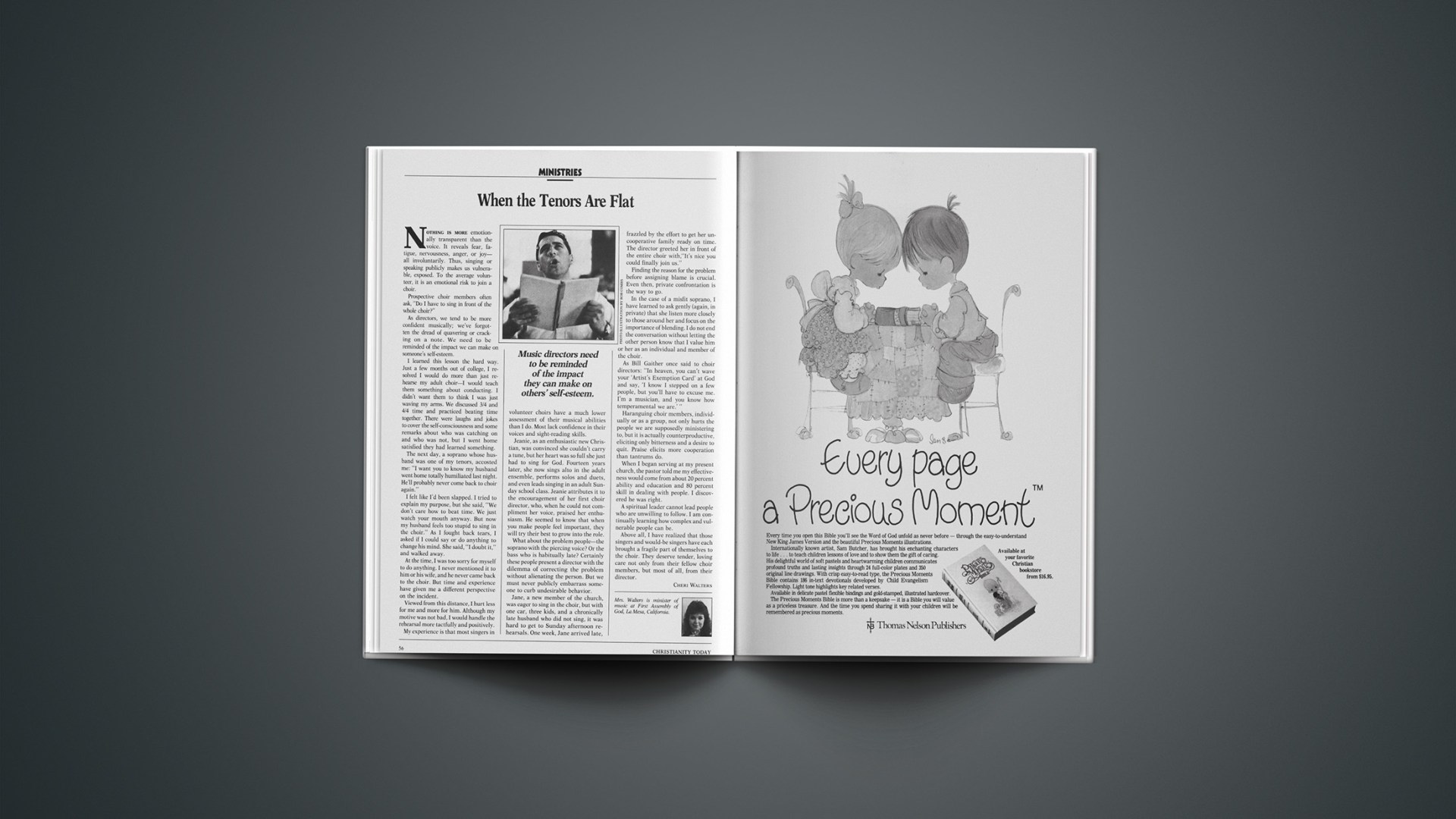Nothing is more emotionally transparent than the voice. It reveals fear, fatigue, nervousness, anger, or joy—all involuntarily. Thus, singing or speaking publicly makes us vulnerable, exposed. To the average volunteer, it is an emotional risk to join a choir.
Prospective choir members often ask, “Do I have to sing in front of the whole choir?”
As directors, we tend to be more confident musically; we’ve forgotten the dread of quavering or cracking on a note. We need to be reminded of the impact we can make on someone’s self-esteem.
I learned this lesson the hard way. Just a few months out of college, I resolved I would do more than just rehearse my adult choir—I would teach them something about conducting. I didn’t want them to think I was just waving my arms. We discussed 3/4 and 4/4 time and practiced beating time together. There were laughs and jokes to cover the self-consciousness and some remarks about who was catching on and who was not, but I went home satisfied they had learned something.
The next day, a soprano whose husband was one of my tenors, accosted me: “I want you to know my husband went home totally humiliated last night. He’ll probably never come back to choir again.”
I felt like I’d been slapped. I tried to explain my purpose, but she said, “We don’t care how to beat time. We just watch your mouth anyway. But now my husband feels too stupid to sing in the choir.” As I fought back tears, I asked if I could say or do anything to change his mind. She said, “I doubt it,” and walked away.
At the time, I was too sorry for myself to do anything. I never mentioned it to him or his wife, and he never came back to the choir. But time and experience have given me a different perspective on the incident.
Viewed from this distance, I hurt less for me and more for him. Although my motive was not bad, I would handle the rehearsal more tactfully and positively.
My experience is that most singers in volunteer choirs have a much lower assessment of their musical abilities than I do. Most lack confidence in their voices and sight-reading skills.
Jeanie, as an enthusiastic new Christian, was convinced she couldn’t carry a tune, but her heart was so full she just had to sing for God. Fourteen years later, she now sings alto in the adult ensemble, performs solos and duets, and even leads singing in an adult Sunday school class. Jeanie attributes it to the encouragement of her first choir director, who, when he could not compliment her voice, praised her enthusiasm. He seemed to know that when you make people feel important, they will try their best to grow into the role.
What about the problem people—the soprano with the piercing voice? Or the bass who is habitually late? Certainly these people present a director with the dilemma of correcting the problem without alienating the person. But we must never publicly embarrass someone to curb undesirable behavior.
Jane, a new member of the church, was eager to sing in the choir, but with one car, three kids, and a chronically late husband who did not sing, it was hard to get to Sunday afternoon rehearsals. One week, Jane arrived late, frazzled by the effort to get her uncooperative family ready on time. The director greeted her in front of the entire choir with, “It’s nice you could finally join us.”
Finding the reason for the problem before assigning blame is crucial. Even then, private confrontation is the way to go.
In the case of a misfit soprano, I have learned to ask gently (again, in private) that she listen more closely to those around her and focus on the importance of blending. I do not end the conversation without letting the other person know that I value him or her as an individual and member of the choir.
As Bill Gaither once said to choir directors: “In heaven, you can’t wave your ‘Artist’s Exemption Card’ at God and say, ‘I know I stepped on a few people, but you’ll have to excuse me. I’m a musician, and you know how temperamental we are.’ ”
Haranguing choir members, individually or as a group, not only hurts the people we are supposedly ministering to, but it is actually counterproductive, eliciting only bitterness and a desire to quit. Praise elicits more cooperation than tantrums do.
When I began serving at my present church, the pastor told me my effectiveness would come from about 20 percent ability and education and 80 percent skill in dealing with people. I discovered he was right.
A spiritual leader cannot lead people who are unwilling to follow. I am continually learning how complex and vulnerable people can be.
Above all, I have realized that those singers and would-be singers have each brought a fragile part of themselves to the choir. They deserve tender, loving care not only from their fellow choir members, but most of all, from their director.
CHERI WALTERS1Mrs. Walters is minister of music at First Assembly of God, La Mesa, California.










